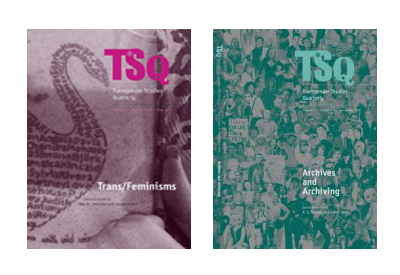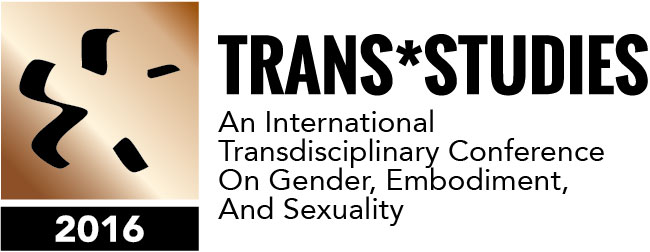At the beginning of September, the University of Arizona hosted the inaugural Trans*Studies Conference – an international and transdisciplinary conference on gender, embodiment, and sexuality. Spearheaded by the incredible effort of U of A’s Institute for LGBT Studies, planning for the conference concretely began last Fall with the assemblage of a steering committee that I was lucky enough to be a part of. The vision for such a conference, however, has an even longer history. It is a part of a larger project – the Transgender Studies Initiative – that was put into motion by Dr. Susan Stryker, a core faculty member in the Gender and Women’s Studies department. Launched in 2013, the Transgender Studies Initiative has also involved a cluster hiring of transgender faculty, the on-going production of a peer-reviewed journal Transgender Studies Quarterly, and plans for a transgender studies master’s program. For Stryker, the vision is to create a sort of “hub” of transgender studies at the U of A in addition to facilitating the creation of an international organization for folks working in this field.

After much anticipation, the Trans*Studies conference proved to be an incredible experience. Needless to say, four long days of keynote lectures, plenary panels, breakout sessions, and nights devoted to poetry, music, and performance art were exhausting. At the same time, as a transgender student and activist with plans on becoming a professor, I found that the conference was also energizing and inspiring. Even in many gender and women’s studies programs, trans and intersex are very often considered subsidiary topical branches. There is also, unfortunately, still a lack of trans faculty (especially trans faculty of color, transfeminine faculty, and disabled trans faculty) in higher education. When hired, these scholars experience multidimensional forms of discrimination and burnout. While the politics of representation are complicated, the lack of this embodied knowledge in academia and the inability of trans and gender non-conforming (GNC) students to see their identities and experiences reflected in those whom they are learning from are significant problems.
To be in a room full of hundreds of trans and GNC scholars, activists, and performers was truly unique and an opportunity I am very grateful for. The conference began with an opening night reception and lecture by theorist and performance artist, Sandy Stone, who is recognized as one of the founders of transgender studies as a discipline. An additional keynote was given by Argentinian intersex and trans activist, Mauro Cabral, who aptly called attention to the tension between the promise of theory and the problematic exclusivity of academia and its inability to holistically serve the needs of the trans community, specifically those living in the Global South. The relationship between scholarship and activism is something I have been debating through my time in higher education thus far, and Cabral’s lecture productively complicated my thoughts on these dynamics.

The conference also hosted over 80 breakout sessions on a wide -variety of topics being explored in transgender studies, from trans archival work and trans technoscience to questions of citizenship, subjectivity, and selfhood. The presenters themselves were equally as diverse, some even traveling to Arizona from countries as far away as Brazil, Australia, and Spain (just to name a few). Personally, I presented a paper entitled, “Technologies of Capacitation: Exploring the Tensions between Trans Embodiment, Capital, and Governmentality.” The other members of my paper were Reese Simpkins, a professor at York University, and Emmett Drager, a graduate student at the University of Southern California. In our papers, all of us were exploring different understandings of embodiment, identity formation, and processes of (un)becoming through the frameworks of new materialism and phenomenology, and I was struck by how well our presentations were in natural conversation with one another.
In addition to the keynote lectures and break out sessions, there were also several roundtable discussions on what the steering committee identified as particularly timely topics for the field: trans-of-color scholarship, trans disability scholarship, and TSQ. The last daytime session of the conference was a Transgender Studies Association Business meeting, in which attendees discussed potential futures not only for an on-going Trans*Studies Conference, but also the possibility of starting a professional organization for those working in the field. One of my favorite events of the whole conference, however, occurred later that evening: the closing party, an event entitled “Trans* Affective Performance Encounters/Encuentros Afectivos de Performance Trans*.” Gathering once again at Fluxx Studio & Gallery – the venue for the previous night’s equally evocative Trans & Genderqueer Poetry Reading – we all enjoyed an evening of art and performances across various mediums and modalities. Outside of the studio – which is, in typical Tucson fashion, located in a warehouse in the middle of the desert – folks gathered in beds of pickup trucks and on fold up chairs, enjoying delicious Mexican food prepared by Mariposas Sin Fronteras, a local community organization advocating for the end of violence against queer people held in prison and immigration detention. Lasting well into the night, through this event, I not only experienced the warm joy of gathering with community, but also felt more deeply connected to the city that I (for now) am calling home.
I am very grateful for those involved in planning the conference, especially the Institute for LGBT Studies, for the immense amount of time and labor they contributed to putting such a huge gathering together. Looking forward, I am excited to consider not only the future of a conference or organization for transgender studies, but also the continual unfolding of the incredible scholarship, art, and activist work being done worldwide.
 This post was written by Point Scholar Mel Ferrara
This post was written by Point Scholar Mel Ferrara
Mel Ferrara is currently pursuing their Ph.D. in Gender and Women’s Studies at the University of Arizona in Tucson. They received their BA in 2015 with a double major in gender and sexuality studies (which they self-designed) and philosophy/political thought. Mel’s research interests are trans and intersex studies, biopolitics, and medicalization of the body. Learn more about Mel here.

